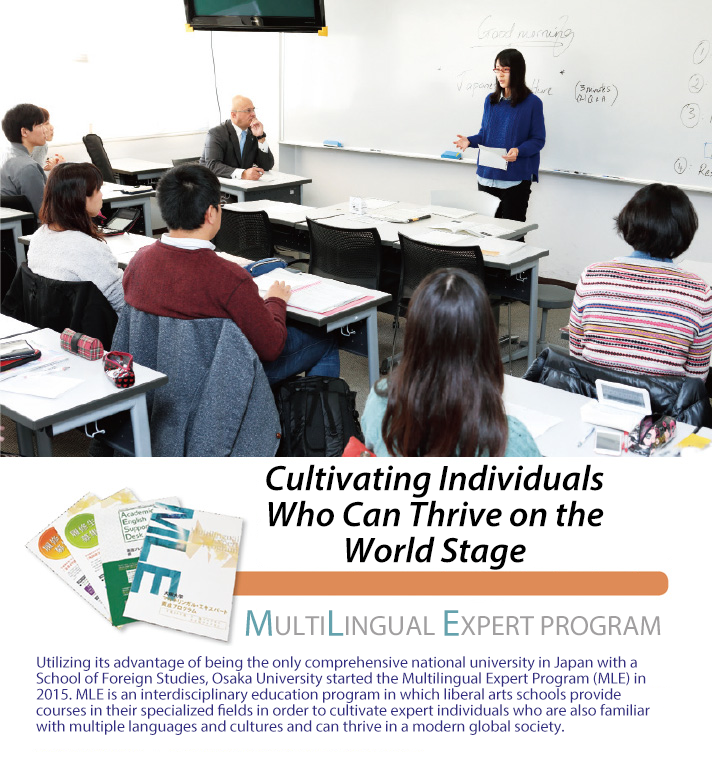
Cultivating Individuals Who Can Thrive on the World Stage -- Multilingual Expert Program (MLE)
Systematic learning at the professional education level
 In MLE, students from the School of Foreign Studies can
take classes in liberal arts subjects (Letters, Human Sciences, Law, and Economics),
while liberal arts students can take classes in foreign studies in order to
learn systematically at the professional education level.
In MLE, students from the School of Foreign Studies can
take classes in liberal arts subjects (Letters, Human Sciences, Law, and Economics),
while liberal arts students can take classes in foreign studies in order to
learn systematically at the professional education level.
In the 2017-2018 academic year, 5 programs were
established for students in the School of Foreign Studies
: 2 humanities programs
(Global Asia Studies, Global Euro Studies), a human sciences program (Ecology of
Symbiosis), a law/political science program, and an economics/business administration program, while
1 program was established for liberal arts students (English
Language/British-American Cultural Studies). Currently, 117 students were
selected to study in the program.
Prof. Hajime OUCHI, Head of the MLE Management Committee, said, “This is an endeavor unique to Osaka University that shows the fruits of the merger with Osaka University of Foreign Studies (in 2007) in a tangible form. The students are growing while encouraging each other, making for some great synergy. I want students to enter society with the confidence that they studied just as much here as they did in their major.”
Interacting across school boundaries
Students
also greatly benefit from mutual interaction
across the boundaries of their undergraduate schools. “Students are extremely
ambitious, saying things like, ‘this is a great opportunity to improve myself.’
The
most frequent comment from MLE students is, 'this program has
broadened my view and allowed me to grow,’” said Specially Appointed Assistant
Professor Kimihito KUBO, an instructor in the program. Many students wrote comments about what drew them to the program, such as, “I can study in a wide range of fields at the professional level” and “I can use knowledge gained through taking courses in
other schools in my field of expertise.”
Individualized instruction for presentations at international conferences
Another pillar of MLE is the “Academic English Support
Desk.” In order to strengthen public
speaking abilities for research
presentations at international conferences, expert native instructors provide individualized instruction for improving English presentation skills and correct English
materials for presentations. The
desk is open to all undergraduate and graduate students, as well as faculty,
staff, and researchers on the Toyonaka, Suita, and Minoh campuses.
In the 2017-2018
academic year, 135 individuals received support, with 58 of those individuals making actual presentations at international
conferences. Specially Appointed Assistant Professor Kimihito KUBO showed his
confidence in the Support Desk, saying, “This is a
high-level,
sophisticated program
that you won’t find at any other university. It will surely stimulate young
researchers
who are about to take flight into the world.”

Enhancing language education in a new organizational structure
From April 2018, short programs in Spanish language and
culture for
liberal arts students will be added to
MLE
, with MLE beginning operations
as a Graduate Minor Program as well. There are also talks being held regarding the
possibility of collaboration with the “Multilingual Education Center,” which is
in charge of language education for the entire university.
Professor Ouchi said, “I hope we can develop
language programs in the 24 foreign languages (not including Japanese) taught at the
School of Foreign Studies.” He spoke more about this ambition, saying, “True learning is deepening understanding of the culture, literature, and history of
a language area after acquiring proficiency in that language. I want to
further improve the environment for cultivating
talent
who will be active on the world stage in the
true sense of the word.”
Voices of Students

Expanding your point of view and developing what you learned in the program in your major
● Nana CHISHIMA (4 th year, Mongolian language major, School of Foreign Studies)
I’m in the “Human Sciences (Ecology of Symbiosis)”
program, in which we
learn about a
wide range of social issues, from the elderly in Japan to immigration overseas, in terms of human psychology and behavior.
I was also inspired by other students, which has
broadened my field of view. Learning about various things, such as welfare
systems in Europe and community care in Southeast Asia, raises another question:
what is going on in Mongolia? I’m glad that I can relate what I learned to my
major.
I’ve received a job offer from a trading company, at which I’ve heard that it’s important to be able to flexibly take in information. The attitude toward learning that I acquired in this program will surely serve me well in my work.
 Acquiring practical English writing skills
Acquiring practical English writing skills
● Miho HORINOUCHI (3 rd year, International Politics, School of Law)
At university, there are no compulsory English courses
from year 3, but I
felt that ending my study of English was a waste, so I took the “English
Language/British-American Cultural Studies Course.”
The Academic Writing
class, where we write essays, etc. in English, gives practical advice, so I feel I
can acquire high level English writing skills. Learning
writing structure has also
improved my English presentation skills and even
my Japanese writing ability.
My dream is to become an air traffic control officer. Since they also need to communicate with pilots from overseas, language ability is a must. I want to make use of the skills I’ve cultivated and head towards my goal.
This is a reprint of the article posted in the Osaka University NewsLetter No. 78 (February 2018).